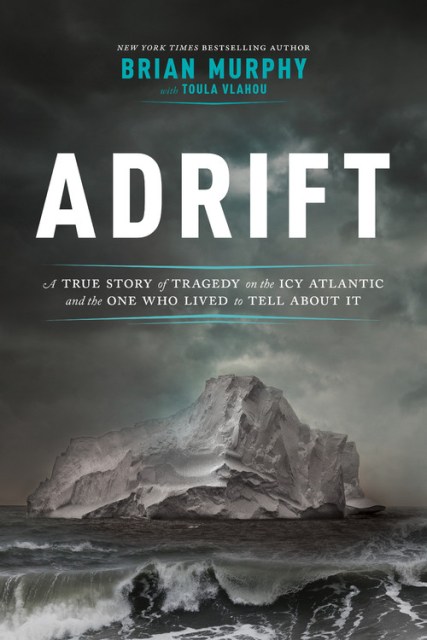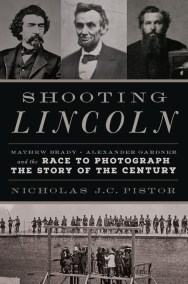By clicking “Accept,” you agree to the use of cookies and similar technologies on your device as set forth in our Cookie Policy and our Privacy Policy. Please note that certain cookies are essential for this website to function properly and do not require user consent to be deployed.
Adrift
A True Story of Tragedy on the Icy Atlantic and the One Who Lived to Tell about It
Contributors
By Brian Murphy
With Toula Vlahou
Formats and Prices
Price
$27.00Price
$35.00 CADFormat
Format:
- Hardcover $27.00 $35.00 CAD
- ebook $13.99 $17.99 CAD
- Audiobook Download (Unabridged)
Also available from:
The small ship making the Liverpool-to-New York trip in the early months of 1856 carried mail, crates of dry goods, and more than one hundred passengers, mostly Irish emigrants. Suddenly an iceberg tore the ship asunder and five lifeboats were lowered. As four lifeboats drifted into the fog and icy water, never to be heard from again, the last boat wrenched away from the sinking ship with a few blankets, some water and biscuits, and thirteen souls. Only one would survive. This is his story.
As they started their nine days adrift more than four hundred miles off Newfoundland, the castaways–an Irish couple and their two boys, an English woman and her daughter, newlyweds from Ireland, and several crewmen, including Thomas W. Nye from Fairhaven, Massachusetts–began fighting over food and water. One by one, though, day by day, they died. Some from exposure, others from madness and panic. In the end, only Nye and the ship’s log survived.
Using Nye’s firsthand descriptions and later newspaper accounts, ship’s logs, assorted diaries, and family archives, Brian Murphy chronicles the horrific nine days that thirteen people suffered adrift on the cold gray Atlantic. Adrift brings readers to the edge of human limits, where every frantic decision and desperate act is a potential life saver or life taker.
-
"The dramatic story of Thomas W. Nye, the sole survivor of the John Rutledge's tragic encounter with an iceberg in 1856, is beautifully rendered, gripping, and emotionally engaging from beginning to end. Murphy and Vlahou perform a literary magic trick of sorts, transporting readers into another era and enabling them to see and feel what it was like to travel across the ice-choked north Atlantic in the depths of winter, and confront the ultimate nightmare scenario--a sinking ship in the middle of the ocean with no help in sight. Adrift is a chilling and searingly memorable tale of unimaginable suffering and one man's bittersweet triumph over the odds."--Eric Jay Dolin, author of Black Flags, Blue Waters and Leviathan
-
"Ice is a killer. It kills ships and it kills the men and women on them. Brian Murphy reminds us that for every famous ship that goes down--think Titanic--countless thousands of others have been lost at sea, nameless, forgotten. In Adrift he brings back to life the story of the John Rutledge, and of the crusty Yankee sailors and seasick Irish immigrants who were aboard, and who died when the three-master foundered in the lonely, iceberg-studded North Atlantic--all but one man, that is, Thomas Nye, who kept his wits about him in a frigid open lifeboat and, half-frozen, clung to life. Murphy writes with such authority, you can feel the cold creeping into your bones."--Will Englund, Pulitzer, Polk, and Overseas Press Club Award-winning journalist
-
"It's obvious tremendous research went into Adrift, and maritime history buffs will appreciate not only the saga of the Rutledge but also other ships in peril during the 1800s, when crossing the Atlantic in winter was literally a life-and-death gamble."--Michael J. Tougias, coauthor of So Close to Home, The Finest Hours, and Above & Beyond
-
"Murphy writes a detailed but fascinating account of the ship leaving Liverpool harbor; it sounds as if he has done so on a sailing craft himself...He has researched the era assiduously."Internet Review of Books
-
"[Brian Murphy] almost makes readers feel as if they were passengers in the lifeboat...and skillfully weaves a story of heroism, delusion, and survival...Adrift is well-written and well-researched, and offers a valuable analysis of a tragedy that is symbolic of hundreds of similar tragedies on the open seas."New York Journal of Books
-
"A magnificently researched telling of the sinking of the John Rutledge and subsequent nightmare endured by her passengers and crew...A gripping and informative read...Readers don't need to be able to discern a mizzen from a main or port from starboard to enjoy Murphy's tale of Thomas Nye and his fight for survival...As beach season comes to a close and hurricane season begins to come into full swing, there are few better books to remind readers of the power of the deep blue ocean than Brian Murphy's Adrift."Shipwreckology
-
"Extensively researched and likely the best book ever written explaining the decades lasting, interlacing effects of shipwrecks on families, businesses, and even global politics...[For] both scholars and the general public alike."Shipwrecks.com
-
"A heartrending and compelling account of shipwreck and survival...Vividly recreates life and sailing in the middle of the 19th century. [Murphy's] primary purpose is to tell the story of one ship and the people aboard her, yet a secondary goal is for the book to serve as an elegy to all the forgotten men, women, and children who lost their lives. He accomplishes both with dignity and passion. Adrift is so riveting that even in the midst of summer heat, the wintry cold seeps so deeply into your bones that not even the warmest wool will dispel the bleak aloneness of being surrounded by water and ice in a small boat."Pirates and Privateers
-
"A tale of harrowing adventure, but also a study of human nature in desperate circumstances when conventional morality and social norms are washed away."The Literate Quilter
-
"Murphy's use of nautical terms and imagery situates readers in the boat with boatswains and horseshoe crabs, longboats and buoys and dock riggers...[A] forward-moving, wave-after-wave story...Gripping."Washington Independent Review of Books
-
"Consider the modern-day books on boat-meets-immoveable-object: ships doomed by rogue waves (The Perfect Storm), humongous whales (In the Heart of the Sea) and wartime torpedoes (Dead Wake)...Joining this flotilla of masterful histories is Brian Murphy's Adrift."Winnipeg Free Press
-
"Piecing together information from newspaper accounts, diaries, family records and the salvaged log, Murphy has meticulously reconstructed the events of the tragic collision at sea and its aftermath."Cape Cod Times
-
"Read this book now. It feels like Sebastian Junger's The Perfect Storm meets the sinking scenes from the movie 'Titanic'...A thrilling page-turner of a true survival tale...The best historical nonfiction you'll read this year."New Bedford Standard-Times
-
"Murphy combines great story telling with a detailed explanation of Nineteenth Century ocean travel...It also is a great look at how human's behave under the most stressful situations...An excellent story of one of the many tragedies that befell many transatlantic travelers."Collected Miscellany
- On Sale
- Sep 4, 2018
- Page Count
- 288 pages
- Publisher
- Da Capo
- ISBN-13
- 9780306902000
Newsletter Signup
By clicking ‘Sign Up,’ I acknowledge that I have read and agree to Hachette Book Group’s Privacy Policy and Terms of Use







